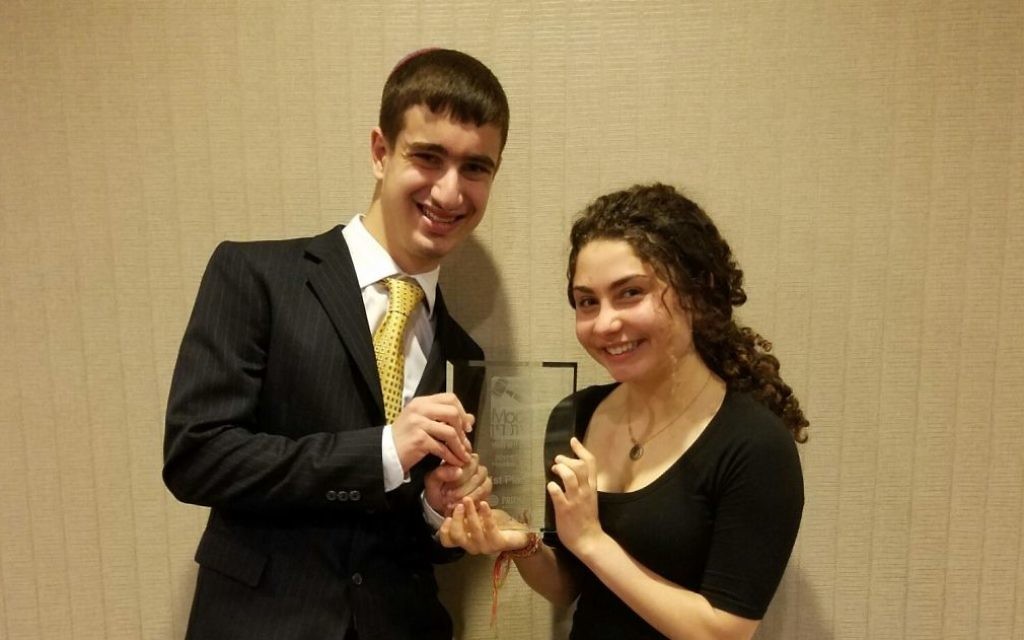Weber Team Wins National Beit Din Contest
The two students argue that a self-driving car in a crash falls under Jewish law involving a tame ox.

A two-student Weber School team won a national championship Sunday, March 19, by successfully arguing that a self-driving car involved in a nonfatal traffic accident should be viewed like a tam (tame) ox under Jewish law.
Junior Aaron Gordon, 17, and sophomore Aliza Abusch-Magder, 16, competed with 135 other students from 28 Jewish schools across the United States and Canada at the Prizmah: Center for Jewish Day Schools Moot Beit Din competition in Houston after a Shabbaton and
other events that began March 16.
Get The AJT Newsletter by email and never miss our top stories Free Sign Up
All the teams were charged with applying halachah to a case in which a Jewish woman’s self-driving car swerved into oncoming traffic to avoid a jaywalker and smashed into a Jewish man’s manual vehicle. The man’s car sustains serious damage, and he requires months of recovery time. The jaywalker disappears.
The man sues the woman for his medical bills, his lost wages and the damage to his car. The woman says he should sue carmaker Eliva Industries and CEO Eli Levine instead.
Rachel Rothstein, the social studies teacher who accompanied Aaron and Aliza to Houston when their faculty adviser, Moshe Sokol, couldn’t make the trip, said most teams treated the self-driving car like fire: a useful tool started by humans that sometimes gets out of control and causes unintended harm.
The Weber team disagreed. While Aaron and Aliza judged the jaywalker’s actions to be like fire — causing unintended damage spreading uncontrollably — they preferred the analogy of the tam ox because, like the ox, the car makes its decisions and controls where it goes after a human sets it in motion, it has a function only when moving, and it caused limited damage after lacking any history of violence (or accidents).
In the absence of the jaywalker, the Weber students decided the owner of the self-driving car was liable for the damage to the other car and should cover half of any medical expenses not paid by the other driver’s insurance. But she did not owe him for lost wages.
Just as important, the car company was not liable at all because it had followed the Jewish principle of pukuach nefesh and given primacy to the preservation of life in programming its car.
The car “did the right thing,” said Aaron, the son of Lynn and Brian Gordon. “It hit the other car to avoid killing the pedestrian.”
The Prizmah judges praised the Weber team’s written ruling for its “clear and convincing positive classification” of the self-driving car as a tam ox and its rejection of the parallels to three other potential sources of damage — fire, a pit, and a chewer or tooth — in applying ancient Jewish law to a modern, high-tech case.
The students’ written ruling accounted for half their score; the other half came from an eight-minute oral argument and eight minutes of questions and answers with judges in Houston. Aaron and Aliza, competing in a category of teams allowed to use only the 23 sources provided by Prizmah, topped six other teams to win their group and the championship.
Aliza, the daughter of Epstein School Head of School David Abusch-Magder and Rabbi Ruth Abusch-Magder, had left for Houston from the Georgia Aquarium, where she spoke Thursday night about the importance of the Metro Atlanta Community Mikvah to teenagers during the Mitzvah for the Mikvah gala.
She said the two experiences are connected. “The reason behind both is I have an interest in exploring Jewish tradition and using it to enhance my life now and using the rich tradition I come from to find happiness.”
While winning was nice, both Weber students emphasized their pleasure at spending the weekend praying and discussing Jewish issues with a diverse group of their peers.
“It was a cool opportunity,” Aaron said. “It was an amazing experience to be with so many other Jewish students.”




comments